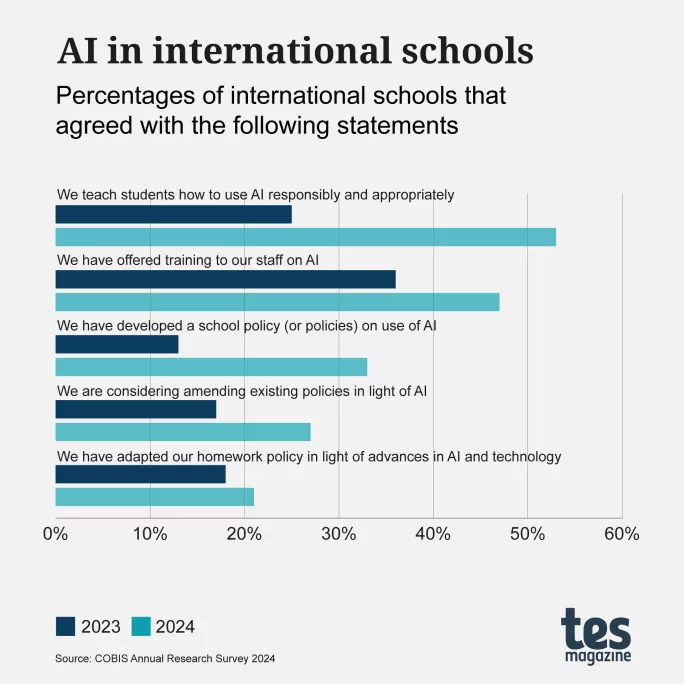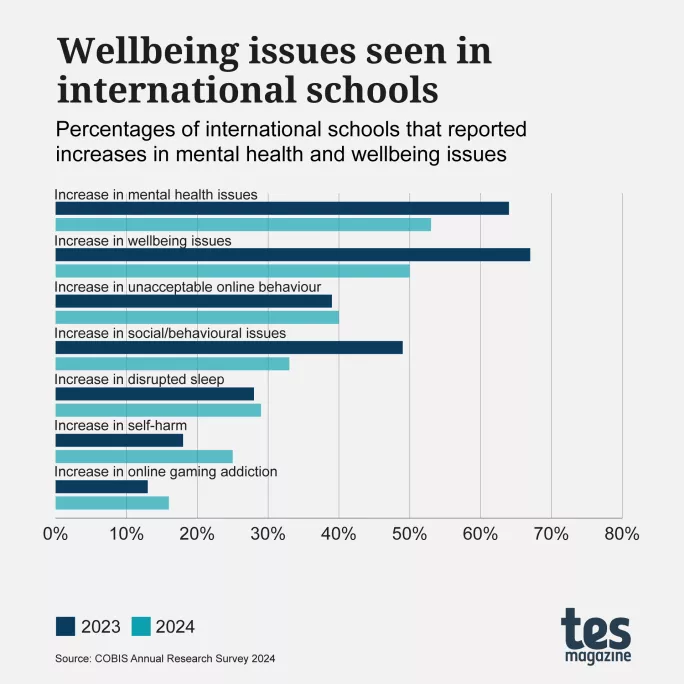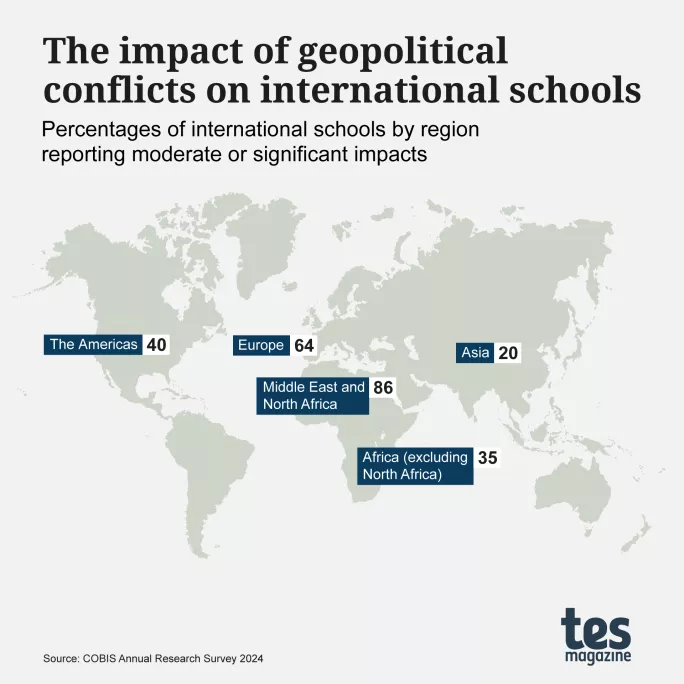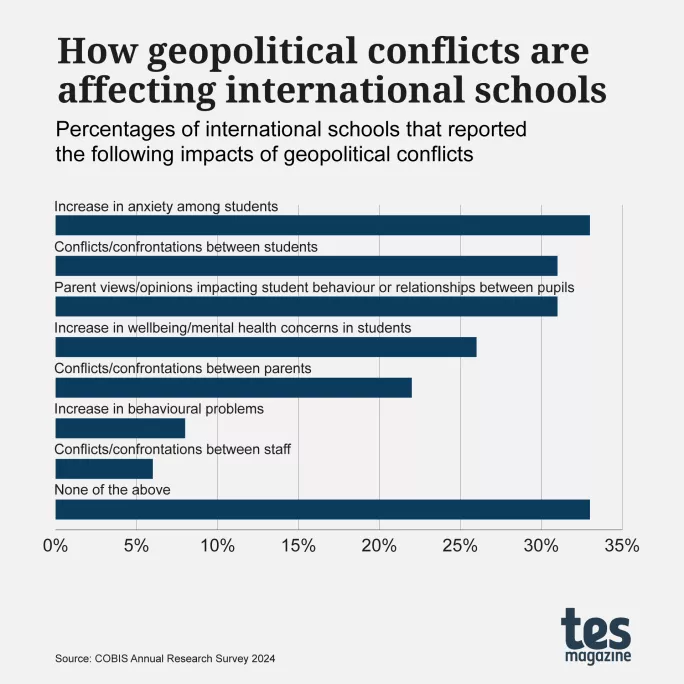- Home
- Analysis
- Specialist Sector
- AI, politics and wellbeing: a changing world for international schools
AI, politics and wellbeing: a changing world for international schools

The number of international schools delivering lessons on artificial intelligence has more than doubled within a year, according to new research by the Council of British International Schools (COBIS).
Of more than 150 schools worldwide that were questioned for the COBIS Annual Research Survey, 53 per cent said they were actively teaching students “how to use AI responsibly and appropriately”, up from 25 per cent last year - a change that underlines the growing awareness and focus on AI among international school groups and education generally.
Furthermore, 47 per cent of international schools said they were providing training for teachers on AI, up from 36 per cent last year, while almost a third have now created a dedicated policy on the use of AI. A fifth of schools also said they had amended safeguarding policies due to developments with AI.
International schools embracing AI
Colin Bell, chief executive of COBIS, told Tes that he has spoken with numerous school leaders about the move towards AI in order to ensure that they remain up to speed with this new challenge.
“I see a real excitement and a hunger to equip students and the staff with the right tools for the job - there is far less reticence to get involved with the whole AI piece than before,” he said.
“I think many have realised this is the flow of things now and it is important to be a part of that and satisfy the competitive nature of international schools. Any school that treads water does so at their peril really.”

Wellbeing problems remain
The report also reveals concerns about pupil wellbeing and mental health, although the situation has improved.
Overall, 53 per cent of respondents said they had seen an increase in mental health issues this year, while 50 per cent said they had seen an increase in wellbeing issues.
Both these figures are down on last year, though, when 64 per cent and 67 per cent of schools reported respective increases.
- Last year’s COBIS report: Quarter of overseas schools teach ‘responsible’ AI use
- AI in education: Three ways it can have the biggest impact in schools
- IB boss: Why we must address emotional wellbeing at primary level
Furthermore, while last year 49 per cent of schools reported an increase in social/behavioural issues, this year that figure dropped to 33 per cent.
Given that last year 61 per cent of schools said they had increased their focus on wellbeing within the curriculum, these findings suggest that this is paying off.
Other issues remain stubbornly problematic, however, with reported increases in unacceptable online behaviour (40 per cent), disrupted sleep (29 per cent) and suicidal ideation (14 per cent) at roughly similar levels as last year.
Perhaps most alarming, though, is that while last year 18 per cent of respondents said they had seen a rise in self-harm, this figure increased to 25 per cent this year.

Geopolitical conflicts affecting schools
Given the global nature of the international school market, it is no surprise that geopolitical events, such as wars, elections and cultural events, impact on school life - especially as the average school has 38 different nationalities within its student cohort.
This year, for the first time, the COBIS research delved into how these events impact on school life, classroom teaching and even parent-school relationships.
Overall, 53 per cent of respondents said their school saw an impact from geopolitical situations, of either a significant amount (19 per cent) or a moderate amount (34 per cent).

What’s more, addressing these issues, whatever they may be, is not straightforward for international schools, with 41 per cent of schools saying they did not address conflicts within their region due to a number of factors.
These issues ranged from being sensitive to local contexts (73 per cent), avoiding conflict within the local community (70 per cent) and even being mandated by local government guidance not to discuss events (51 per cent).
In a third of cases, it was reported that the school owner or board advised schools not to tackle such topics.
If schools do broach complex geopolitical topics, it is usually done so in response to a question from a student (67 per cent) or during class time (65 per cent) or assemblies (57 per cent).
Whatever stance schools take, it is clear that the impact of such events cannot be avoided, with it affecting school life in numerous ways - including among parents within the school community.

Bell said the data underlined how “incredibly complex” it can be for international schools dealing with these situations but that, if they are able to, schools “don’t shy away from trying to discuss it with students”.
He added: “Schools recognise it’s an important component of students’ life and the life of the school community.”
Teacher recruitment
Another notable statistic in the report is that the average international school had 48 per cent of teachers as UK nationals - up on 42 per cent in 2023. This is also higher than the figure for 2022 of 47 per cent.
This reflects small improvements in schools’ ability to find suitable hires for new jobs, with 87 per cent of respondents saying they find it somewhat challenging or very challenging to find teachers. While this figure is high, it is down from 91 per cent in 2023.
While recruitment remains tough, the overall outcome is usually positive, with 96 per cent of schools saying they were always or sometimes able to recruit candidates of a calibre that met their expectations.
Bell said it was clear that international teaching remained an “attractive proposition” for many, adding that it often helps to reinvigorate a teacher’s career or boost their skills to enhance their career prospects.
“We’ve seen in other reports that many teachers were thinking about leaving the profession before they went overseas. So it’s a great opportunity, whatever stage in your career your at, to go overseas and see if it’s for you.”
International schools are offering more flexible working, too, with 34 per cent saying they offer home or remote working, 42 per cent saying they provide family/personal days and 22 per cent offering roles as job shares.
Meanwhile, for support and administrative staff roles, 45 per cent of schools said they offered these with flexible or remote working options.
Bell said the schools he talks to often do this in collaboration with staff to ensure that their flexible-working policies have the biggest impact.
“They consult with their team and their staff, so it’s done with mutual consultation to be helpful,” he said.
For the latest education news and analysis delivered every weekday morning, sign up for the Tes Daily newsletter
Keep reading for just £1 per month
You've reached your limit of free articles this month. Subscribe for £1 per month for three months and get:
- Unlimited access to all Tes magazine content
- Exclusive subscriber-only stories
- Award-winning email newsletters
topics in this article



